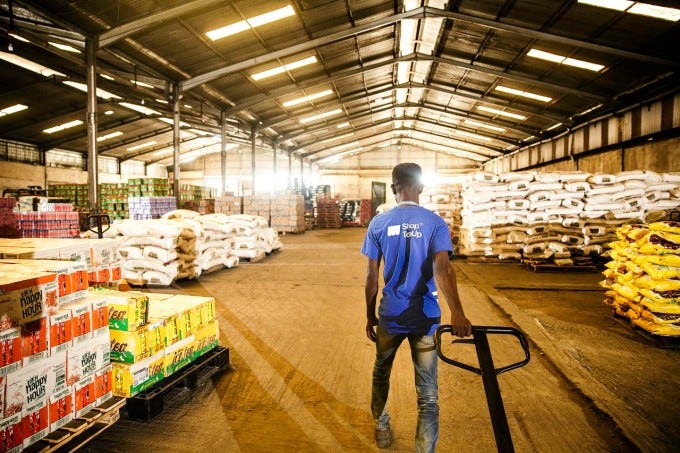TradeDepot, a Nigerian and American startup that connects consumer goods brands to thousands of retailers and assists with distribution, has raised $110 million in new equity and debt capital to extend its purchase now, pay later service throughout the continent.
“Four or five years ago, if you were having a conversation with an investor, there was a lot of education required to convince them why this was an opportunity and why they should come on board,” said the CEO, CEO Onyekachi Izukanne.
“I think what we’re seeing is that the market is now awake to that opportunity. You have more parties, especially several serious ones coming in and trying to help build this. There’s a lot of iteration required to figure out the models that work. And more parties that you find hacking at this kind of speeds up innovation within the space, so that’s super useful.

Despite the fact that TradeDepot declined to comment on the equity-to-debt ratio, data from the company’s SEC filing puts the equity share at around $42 million.
Read also AfCTA: Africa Will be The Largest Free Trade Area Globally With $3trn GDP
The Series B funding comes roughly eighteen months after Partech Africa and the International Finance Corporation co-led a $10 million round (IFC).
The financing was led by IFC, with participation from Novastar, Sahel Capital, CDC Group, Endeavor Catalyst, and existing investors Partech and MSA Capital. Arcadia Funds, a lender that specializes in peer-to-peer and marketplace lending as well as insurance-linked products, led the debt financing.
Wale Ayeni, the IFC’s head of Africa Venture Capital Investment, and Brian Odhiambo, the West Africa director of Novastar Ventures, will join TradeDepot’s board as part of the transaction.
TradeDepot’s Series B investment is the largest in both equity and debt for any B2B e-commerce platform in Africa right now. The company started out supplying milk to small shops in Lagos, Nigeria, and was one of the first in the field.
TradeDepot will double down on its activities in Nigeria, Ghana and South Africa (Accra, Johannesburg and ten cities in Nigeria) and expand its reach across Nigeria, according to Izukanne, in an attempt to capture more of the 5 million SMEs it views as its target market with the new money. The debt finance will be used to help these retailers receive the BNPL service.
Read also Tax Machines For Businesses In Kenya Get New January 15 Deadline
Why The Investors Invested
The startup has acquired considerable traction since its last funding. According to CEO Onyekachi Izukanne, the company had over 40,000 merchants on its platform last year, but now it has over 100,000. During the call with the CEO, he also revealed that during this time, TradeDepot’s GMV increased by 5x. When the five-year-old company revealed plans to issue credit in 2020, it established scoring models by financing credit to shops off its balance sheets using equity. According to the company, its Buy Now, Pay Later model has now resulted in a 200 percent boost in transaction volumes for retailers.
“The informal sector is a large and critical part of Africa’s economy, accounting for around 80% of jobs in the region,” said Makhtar Diop, IFC’s Managing Director, in a statement. “We are excited to work with TradeDepot to leverage technology to help small businesses across the continent, particularly the many retailers led by women, access the resources they need to grow and scale.”
The startup also maintains a relatively strong team. Co-founders Onyekachi Izukanne, Michael Ukpong and Ruke Awaritefe have worked together on 3 startups over the last 15 years. They co-founded SocketWorks, an IFC-funded EdTech startup, and prior to TradeDepot, founded C2G Consulting — a technology consulting business — and grew it to become one of the leading SAP consulting houses in West Africa with over $40m earned in revenues. Michael and Kachi both have degrees in Electronic Engineering and a software development background, while Ruke has a degree in Economics & Statistics and a background in data science.
Read also Nigerian Fintech Startup Flex Finance Secures Pre-seed Funding
Novastar Ventures invests mostly in technology-based solutions, wearing mostly a sector agnostic look. It has invested in everything from Agritech (GreenPath), to edtech( Bridge), news site (hivisasa), to job platforms (Lynk), to mPharma, as well as logistics and mobility (Max.ng); however it seems the VC has more portfolios in agritech and cleantech. The VC says it looks for market potential, focused strategies, business model innovation, and a fundamental alignment between commercial success and positive social impact. But the quality of the founders trumps these, it says.
Since its inception in 2010, Sahel Capital, which is based in Lagos, Nigeria, has invested in and built SME agribusinesses throughout seven agricultural value chains, raising its first $65.9 million Fund for Agricultural Finance in Nigeria (FAFIN) in 2014 (final close in 2017). The VC recently launched a $24m fund to invest in African startups.

A Look At What The Startup Does
First launched in 2016 by the Nigerian trio of Onyekachi Izukanne, Michael Ukpong and Ruke Awaritefe, TradeDepot is a B2B platform that connects small businesses, kiosks, and retailers with global consumer brand wholesalers who supply food, beverages, and personal care items. To carry out distribution, the corporation owns own warehouses and fleets of drivers.
Retailers order and pay for goods using TradeDepot’s mobile apps (Android and Whatsapp), USSD or a toll-free number and have them delivered directly to their stores via the company’s fleet of vans and tricycles.
They can also order stock and manage their inventory online, with a number of ways to pay, including digital payments and cash. TradeDepot’s business depends on making a range of household supplies like milk, soap, and detergent more accessible and affordable for the street-side vendors and small shops that provide goods and services for hundreds of communities in cities like Lagos — where the company is headquartered.
For consumer goods brands, TradeDepot enables direct-to-retail distribution in the massive informal sector in some of Africa’s busiest cities. TradeDepot also provides a CRM and data management system that enables suppliers to plan and monitor their sales routes in real time, as well as gain invaluable insights into trade and retail data.
Read also MTN Zambia Signs Landmark Digital Payments Deal with Hungry Lion Zambia
TradeDepot said, in a statement, that it has built up a sizable network of small businesses in Nigeria and connects them to local distributors of global consumer brands like Nestlé, Unilever, GB Foods and Danone.
The company said that a new store comes online to use its services every three minutes and that the company receives an order from retailers every four seconds, on average.
To individuals who have been onboarded, the company now offers a full variety of products, including digital wallets and financial services, particularly credit or BNPL options.
The BNPL service is integrated into the company’s ShopTopUp platform, which gives retailers access to a credit line for any consumer goods purchased through the app.
TradeDepot, like any other B2B e-commerce platform that offers BNPL services, does not issue cash advances to merchants. Instead, it delivers customers the things and allows them to pay in installments. The monthly repayment value is around 5%.
TradeDepot is active across 12 cities in Nigeria, Ghana and South Africa (Accra, Johannesburg and ten cities in Nigeria).
Charles Rapulu Udoh

Charles Rapulu Udoh is a Lagos-based lawyer who has advised startups across Africa on issues such as startup funding (Venture Capital, Debt financing, private equity, angel investing etc), taxation, strategies, etc. He also has special focus on the protection of business or brands’ intellectual property rights ( such as trademark, patent or design) across Africa and other foreign jurisdictions.
He is well versed on issues of ESG (sustainability), media and entertainment law, corporate finance and governance.
He is also an award-winning writer
